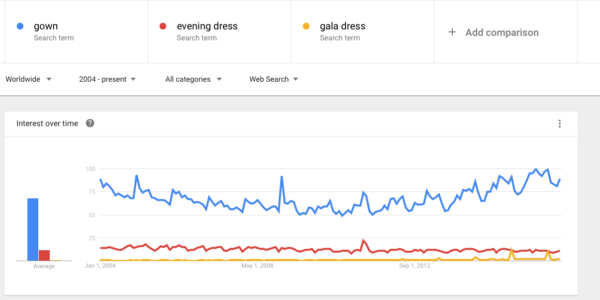Marieke van de Rakt is the founder of Yoast SEO Academy and CEO of Yoast. Her favorite SEO topics are SEO copywriting and site structure.
Thinking about the keywords you want to rank for is really the first and foremost step you need to take for your SEO strategy. Still, keyword research can be quite daunting. So, which keyword research mistakes should you avoid at all times? In this post, I’ll take you through the most common keyword research mistakes people are making. Being aware of these mistakes helps you set up a successful keyword research strategy and avoid practices that harm your rankings.
Overwhelmed by all the intricacies of keyword research, and afraid you’ll still make these mistakes or others? Take a look at our keyword research training, part of our Yoast SEO academy training subscription, and let us help you carry it out!
1. Not executing your keyword research correctly
Some people seem to think that they can forego keyword research, or that it’s no longer important. Doing proper keyword research can indeed be a tough, time-consuming process. And it’s true that ranking high isn’t just a matter of stuffing the right keyword in your text, and it hasn’t been for a long time. But skipping or winging your keyword research means you create content without a single idea of what your potential users are looking for. Don’t make the mistake of thinking that you’ll just instinctively know what your audience wants.
It’s still crucial you take some time to really dive into the language of your audience. Which words do they use? What terms do they search for? Which terms are competitive and which less so? The result of your keyword research should be an extensive list of keywords you would like to rank for. Make sure to update your keyword research list or sheet regularly. Your audience may change, as could your business focus and business needs. That has implications for your keyword strategy as well.
Read more: Keyword research: the ultimate guide »
2. Aiming at unrealistic keywords
Make sure you aim for realistic keywords. Some niches are very competitive. Ranking in competitive niches is hard, especially if you’re just starting your website or business. If you’re just starting out, you shouldn’t aim for the competitive ‘head’ keywords (yet). Instead, focus on long tail keywords (which are easier to rank for and have a higher chance to convert).
For instance, if you have a fitness center and start a blog about fitness, it will be too hard to start ranking for the term [fitness]. Find out which aspects of your blog are unique and try ranking for those terms. Perhaps you write about fitness exercises for retired people. Aiming to rank for [fitness routines for retired people] could be a good strategy. In that case, you should also aim for [fitness tips for seniors], [fitness exercises for retirees] and so on. If you have been around in your niche for a little longer and you successfully rank for long-tail keywords, you could aim to rank for more head terms as well. Ranking for competitive keywords should be part of a long-term successful keyword research strategy.
Keep reading: Why focus on long tail keywords? »
3. Not thinking about search intent
More than ever, taking a good look at search intent is a crucial part of keyword research. You need to have a clear idea of the kind of intent that’s behind your keywords. People could be looking for information (informational intent), a specific website (navigational intent), or they might want to buy something (commercial or transactional intent). And that’s not all there is to it, as search engines aim to give users the exact answer they’re looking for. In other words, if your content doesn’t match searcher’s intent, it probably won’t make it to the results pages, no matter how great and well-optimized it is.
So, it’s important to evaluate whether the content you plan to publish for a certain keyword is in line with what people are looking for. You can do that by looking at the search results. Do the types of intent match? What answers do people want? Is your content in the right form? For instance, if you wrote an extensive DIY post to rank for the term [wedding decorations] and all you see in the results pages is online stores selling wedding decorations, it’s time to rethink your strategy. Check out this post about writing intent-based content for your keywords for more information on how to do that!
4. Using irrelevant keywords
This mistake is partly related to the previous one. If you don’t look at search intent, you’re more likely to optimize for words that potential visitors or customers won’t use. Two things can happen: either you do offer something people are looking for, but these potential visitors simply use different keywords and therefore won’t find you. Or, your keywords are too long tail and don’t get any traffic.
The keywords you aim to rank for should be the same words your customers use. Always try to use the language of your audience. Imagine yourself selling dresses for gala events. In your marketing, you refer to these dresses as ‘gala dresses’. However, most people do not search for [gala dress]. They search for [gown] or [evening dress]. You won’t get much traffic for the search term [gala dress] compared to the search terms [gown] or [evening dress].
 As you can see, a lot more people are looking for [gown] and [evening dress] than for [gala dress]
As you can see, a lot more people are looking for [gown] and [evening dress] than for [gala dress] The second problem could occur when you focus on long tail keywords that are so obscure they simply don’t generate any traffic. Long tail keywords are a great way to start your keyword strategy. These words attract less traffic, but you’ll have a higher chance to convert your visitors into buyers or returning visitors. People that use specific terms, to search for exactly that thing you’re writing about, are just a very good match. However, if your keyword is too specific and doesn’t bring in any traffic, it won’t help your SEO. So make sure you aim for long tail keywords that actually generate some traffic!
5. Focusing on only one keyword per post
If you write a nice blog post, its ranking opportunity may not be limited to one exact keyphrase, but includes related terms as well. So, if you can optimize for related (long tail) keyphrases without stretching it, you should definitely do so. For example, we have a post about timeless SEO tips. It’s optimized for [timeless SEO tips], but also for the similar phrases [universal SEO tactics] and [universal SEO improvements], and it’s doing quite well for each of these keywords.
Not sure how to optimize your content for related keywords and synonyms? Our Yoast SEO Premium plugin can help! It allows you to optimize for related focus keyphrases, and also gives you the option to define synonyms for your focus keyphrase, so that it can take them into account. Awesome, right?
6. Not checking whether you should use singular or plural
Always check if you should target the plural or the singular form of a specific keyword. Should you aim to rank for [ballet shoe] or for [ballet shoes]? Do people search for [holiday home] or [holiday homes]? While Google can recognize that the plural and singular versions of a word refer to the same thing, the search result pages and the number of results are often still different, because what users are looking for differs slightly.
In this case, again, it’s important to think about the intent of people searching for your keyword. Someone looking for the singular version of a keyword may be looking for information, while someone looking for the plural version could be looking to compare products and/or buy something. In any case, whether you should use a singular or a plural depends on your specific keyword and its intent, so take that into account.
7. Forgetting to evaluate
If you aim to rank for certain terms, make sure to check whether you succeed. You need to evaluate regularly if people actually find your articles. One way to do that is googling your proposed focus keyword every now and then. But be aware that your search results may be biased because Google has personalized search. So, use a private browser session, or a tool like https://valentin.app/ and check if your article turns up in the results. If you forget to evaluate, you won’t know whether you could aim for more competitive keywords or you should focus on long tail variants.
Read on: Adapting your content SEO strategy »
Conclusion: avoid these mistakes for a successful keyword research strategy
Executing keyword research takes a lot of time. It’s important that you take that time and really think about the terms you want to rank for. Read Keyword research: the ultimate guide for lots of practical tips that’ll help you to set up a successful keyword research strategy. And if it’s starting to look good, you can check for other common SEO mistakes as well.
Keep on reading: Why every website needs Yoast SEO »
Keep reading the article at SEO blog • Yoast. The article was originally written by Marieke van de Rakt on 2020-03-25 09:30:34.
The article was hand-picked and curated for you by the Editorial Team of WP Archives.

